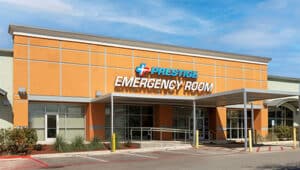Emergency Care for Childhood Poisoning
Accidental poisoning in children can be life-threatening, and you need to know what to do if your child ingests something toxic, how to recognize the symptoms of poisoning, and steps you can take to prevent poisoning. At Prestige ER, our experienced providers can provide assessment and emergency treatment for pediatric poisoning.
Common Types of Poisoning in Pediatrics
Poisoning in children can have many causes. Some of the most common include:
- Household chemicals, paint, and cleaning solutions.
- Medications.
- Cosmetics.
- Plants.
- Herbicides or insecticides.
- Button or disc batteries.
Symptoms of Poisoning in Children
It is essential to be able to recognize common symptoms of poisoning in children:
- Changes in pupil size.
- Blurred vision.
- Sleepiness.
- Confusion.
- Loss of consciousness.
- Seizures.
- Breathing difficulty.
- Nausea and vomiting.
- Irregular heart rate or rhythm.
- Chest pain.
- Difficulty walking.
- Low blood sugar.
- Burns, unusual smells, or stains around a child’s mouth.
Signs of poisoning in babies can include these, and also:
- Persistent crying.
- Irritability.
Poisoning: How to Help Your Child
If you think your child has swallowed poison, here’s what you can do:
- If your child is unconscious, has stopped breathing, or has a seizure, call 911 immediately. If they’ve stopped breathing, start CPR immediately.
- If your child has a medication or substance in their mouth, have them spit it out and take away any they still have and save it. Do not induce vomiting (you may be instructed to do so by a health care provider or poison control later).
- If your child has any of the above poisoning symptoms, call 911 and get them to an emergency room for pediatric poisoning treatment.
- Otherwise, call Poison Control at 800-222-1222 right away. Be prepared to give specifics about the substance or medication your child may have ingested.
- If your child has swallowed a disc or button battery, get them to an ER. They will likely need an X-ray and may need a procedure to remove the battery to prevent damage to their esophagus.
Pediatric Poisoning Treatment in the ER
How does the ER treat pediatric poisoning? In the emergency room, the clinical team will discuss your child’s symptoms and the details of what they ingested while ensuring your child is stable and assessing important vital signs. It is helpful to have information for the provider about what your child ingested, how much they took, and when it happened.
Treatment for poisoning in the ER will depend on the type of poisoning and the substance involved. The trained, experienced providers at Prestige ER are equipped with the resources, diagnostic tools, and treatments needed to manage poisoning emergencies.
Preventing Poisoning in Children
Here are some practical, vital steps you can take to prevent accidental poisoning at home.
Safety Tips for Parents and Caregivers
- Keep medication secured and out of the reach of children, including medication patches. Choose pill bottles with child-resistant caps, but do not rely on these, as children may be able to remove them.
- Keep cosmetic or hair care products out of the reach of small children.
- Keep all batteries, including button or disc batteries, out of the reach of children.
Proper Storage of Toxic Substances
Keeping dangerous substances out of the reach of children is imperative and can prevent accidental poisoning. Here are some important keys:
- Store all cleaning solutions, lawn and garden products, paint, and laundry products out of the reach of children.
- Keep household products in their original containers to avoid confusion.
Get Expert Care for Poisoning at Prestige ER in San Antonio
Our caring, experienced providers at Prestige ER can rapidly assess and treat pediatric poisoning emergencies. We offer specialized pediatric emergency services for a wide range of emergencies, illnesses, and injuries.
For emergency care for all ages near you, visit any of our four convenient San Antonio locations.












